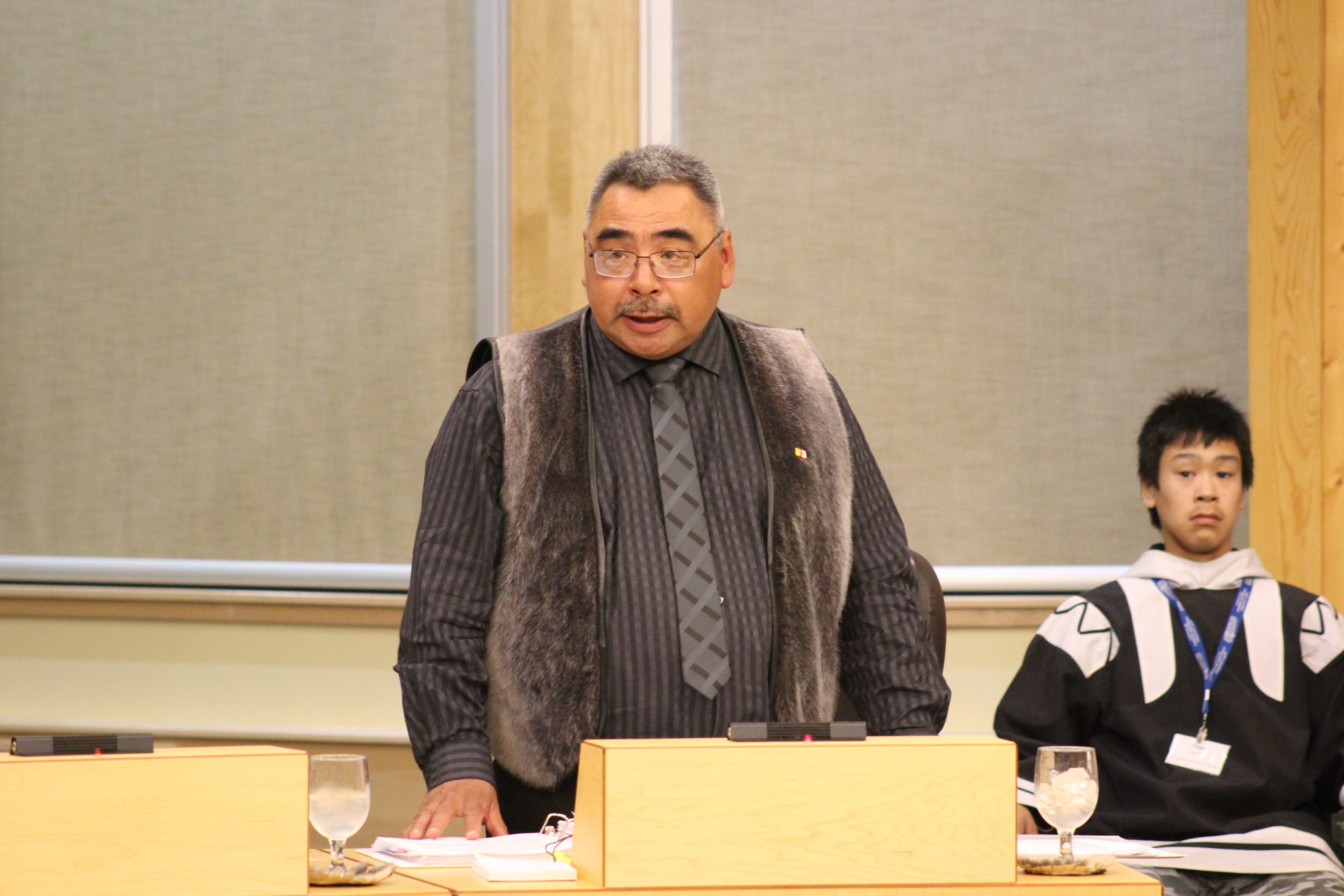Nunavut struggling to implement law aimed at curbing spousal abuse
“It appears that we in this territory are not intervening early enough when it comes to cases of abuse”
David Akeeagok, Nunavut’s acting minister of justice, acknowledged on June 3 that a report on the territory’s Family Abuse Intervention Act “highlighted some of the gaps” that exist between the law’s aspirations and the reality on the ground. (Photo by John Thompson)
When Nunavut’s legislators passed the Family Abuse Intervention Act in 2006, they envisioned the new law would tackle spousal abuse in a way that was more in tune with Inuit culture, and recognized that the territory’s couples in abusive relationships would often remain together.
The law created one key tool called a community intervention order, which requires a couple in an abusive relationship to seek counselling.
It was supposed to be used more frequently than the emergency protection orders, which are essentially restraining orders.
But, according to a report tabled during the recent sitting of Nunavut’s legislature, over the past year community intervention orders have not been used once.
Emergency protection orders, meanwhile, had been granted 60 times.
That’s worrying to John Main, MLA for Arviat North-Whale Cove, who recently raised the matter in the legislature.
“Based on my rudimentary understanding, and I may be incorrect here … but it appears that we in this territory are not intervening early enough when it comes to cases of abuse,” Main said on June 3.
As well, a working group that helps oversee the implementation of the law has been “dormant” due to “the migration of staff, partners and stakeholders,” the report states.
It goes on to say that the community justice division has experienced “a high level of staff turn-over” and has experienced vacancies in community justice specialist positions, as has also been the case for the position of manager of the Family Abuse Intervention Act’s program.
Main asked when the government expects this working group to be reinstated.
It already has been, responded David Akeeagok, Nunavut’s acting minister of justice. (Justice Minister Jeannie Ehaloak was absent.)
Akeeagok acknowledged that the report “highlighted some of the gaps” that exist between the law’s aspirations and the reality on the ground.
“I can assure you that the department is taking steps to try to reduce some of this and including in terms of figuring out how to implement … the Family Abuse Intervention Act,” he said.
The report offers several reasons for community intervention orders not being used.
Sometimes, community justice outreach workers “do not receive referrals for families experiencing family abuse until it has become a crisis situation and emergency intervention is required,” the report states.
Other times, the spouse accused of being abusive declines to participate.
Or both spouses may agree to receive counselling, and then decide there’s no need to follow up with the hearing required for a community intervention order.
To increase the use of community intervention orders, Nunavut’s community justice division “has continued to collaborate with and provide training to RCMP, Family Services and health centre staff in order to identify families who may benefit” from these orders, the report states.
And community justice outreach workers continue to tell frontline workers about community intervention orders, the report states.
These workers also speak to those with emergency protection orders nearing an end, to give them the option of transitioning to a community intervention order, “in order to better support families that wish to maintain their relationships going forward,” the report said.
Main asked Akeeagok whether the government plans to spend more money to help implement the Family Abuse Intervention Act.
It’s too soon to say, said Akeeagok. But, now that the working group has been reinstated, “the funds and the operational needs will be identified,” he said. “So I am expecting that to be submitted soon.”
TD 169 5(2) en Family Abuse Intervention Act 2017 2018 Annual Report 0 by NunatsiaqNews on Scribd







too many people with FAS and they have family in higher up places its hidden and remains hidden! they also keep them out of jail and they keep hurting anyone that gets to know them
The problem is so extreme for so many, housing is a big issue, with so many living under one roof, fights happen, then when alcohol/drugs are part of the package, it just explodes.
The Government needs to step up and build more housing so families can have the burden of overcrowding looked after. In doing so, it should reduce the burden on the households.
Obviously, if abuse continues, and nothing is done, the children will suffer and so will the women in the communities…help is needed?
The idea that government should “step up” and build houses for everyone and forever and ever is not really a practical or realistic one. Though it is an easy answer if you aren’t given to thinking things through.
It is sad domestic issue and main problem is the RCMP and other Person in Authority separating families that been together over 10 years with several children. I disagree with sexes being used against men for some victims. It gives you wrong idea of Inuit men.
Most of the issues and problems inuit have today is the amount of unexpected babies being born. No job, no house, no income, single mother and no means to support a child. Early education should be taught about the huge responsibility of making a child. Yes, we all know it feels good to make one but a lot of inuit do not care/know about the consequences. They think life will get better when they get a kid but in a lot of cases, it brings misery and frustration when not prepared.
Unexpected?? I thought that they were often seen as a desirable source of income?
Other than that, bang on comment!
I agree with your observations and comments, but I strongly
feel absentee fathers should be forced to be more wise and
responsible. No one heard of birth control ?
However, my cousin in the U. K. told me it is exactly the
same situations over there. We ain’t alone.
I worked in one of Nunavut’s jails a few years back. The men and I would often talk about our families. It was not unusual at all to hear that they had anywhere from 5 to even 8 kids. Usually with different mothers. But not always. Anyway, I wondered about those kids and if those kids wondered about their dads.
Also, do not neglect how the practice of custom adoptions has been bastardized from its original form- Whatever it may once have been used for, it has now become a crutch which people can lean on. “Do you want my baby? I’m too lazy to look after my own responsibilities”, to the point where it is viewed by many as an option to birth control, apparently.
Certainly the high birth rate and lack of housing exacerbates this, and to be honest most other social problems in Nunavut.
What needs to be understood is that much of this is cultural. Go back 5 or 6 hundred years and you will see a high birth rate plus high infant mortality, high rates of accidental death, and very short lifespans. Even 100 years ago things were much the same, and most family groups were still semi-nomadic.
Inuit culture gives more status to girls who have had a child – for the reason that up until recently a high fertility rate was needed for group survival. It will take more than a couple of generations to change cultural norms.
Oh no doubt at all. However, and sadly, a couple of generations isn’t available.
The completely unsustainable birthrate, and the huge societal dislocations that we are going to see when the divide between the relatively wealthy Iqaluit/Rankin/Cambridge elite with their well-paid government jobs, and the unemployable and economically futureless welfare recipients everywhere else is going to be messy.
This comment is bang on!
I believe the change of abuse must come from within ourselves.
We are hurt/angry and pay it forward. Hurting people hurt people.
I have no expectation and shouldn’t have expectations that the abuse I went through can be healed by the government, but by my own self, my own choice to go for counselling and work on myself internally. I couldn’t change how my abuser felt/was, he had to do it himself, but he wouldn’t make the choice to see the pain he was causing from his own hurts, so I made the choice to leave and go to counselling for my own self.
It’s up to us ourselves.